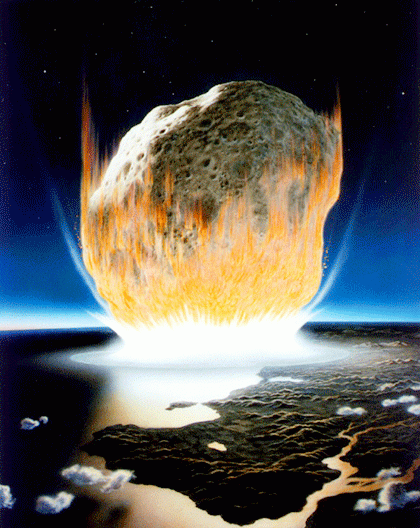Asteroid That Wiped Out Dinosaurs 'Sent Life to Mars and Jupiter'

The asteroid that wiped out dinosaurs from Earth 66 million years ago could have sent rocks carrying life to Mars and Jupiter's moons, researchers have said.
A study by scientists at Penn State University, published in the journal Astrophysics, suggests that the asteroid impact may have catapulted rocks from Earth into space towards Mars and Jupiter.
They looked at the probable trajectory of rocks measuring at least three metres - the minimum size necessary to shield microbial life from the Sun's radiation - and estimated that around 360,000 large life carrying rocks made it to Mars, while at least six went as far as Europa, Jupiter's icy moon.
Lead author Rachel Worth said: "We find that rock capable of carrying life has likely transferred from both Earth and Mars to all of the terrestrial planets in the solar system and Jupiter."
Previously, scientists have said Europa is the most likely place astronomers will find extra-terrestrial life in our solar system.
Worth said that any missions to search for life on Jupiter's moons will have to consider whether biological material came from Earth or originated on the planet independently.
Speaking to BBC News, Worth added: "Even using conservative, realistic estimates ... it's still possible that organisms could be swimming around out there in the oceans of Europa.

"I'd be surprised if life hasn't gotten to Mars ... It seems reasonable that at some point some Earth organisms made it."
The researchers also note that the Chicxulub meteor that is believed to have caused the mass extinction of the dinosaurs 66 million years ago could have sent Earth rocks far into space.
They said Chicxulub sent around 70 billion kilograms of rock into space, around 20,000kg of which could have reached Europa.
However, Jay Melosh, of Purdue University in Indiana, told the BBC that he doubted this asteroid was responsible for extra-terrestrial life: "The study strongly reinforces the conclusion that, once large impacts eject material from the surface of a planet such as the Earth or Mars, the ejected debris easily finds its way from one planet to another.
"The Chicxulub impact itself might not have been a good candidate because it occurred in the ocean (50 to 500m deep water) and, while it might have ejected a few sea-surface creatures, like ammonites, into space, it would not likely have ejected solid rocks.
"I sometimes joke that we might find ammonite shells on the Moon from that event. But other large impacts on the Earth may indeed have ejected rocks into interplanetary space."
© Copyright IBTimes 2025. All rights reserved.






















